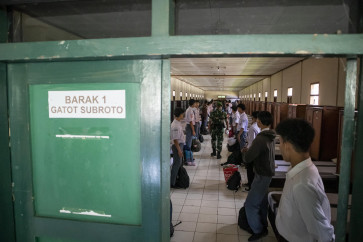Law protects consumers from false ads
Consumers will have stronger protections against the false promises of housing developers after the 2011 Law on Housing and Settlements goes into effect, an activist says
Change text size
Gift Premium Articles
to Anyone

C
onsumers will have stronger protections against the false promises of housing developers after the 2011 Law on Housing and Settlements goes into effect, an activist says.
Indonesian Consumer Protection Foundation (YLKI) chair Sudaryatmo said that under the law, developers would have no more room for false promises in their advertising in order to entice customers.
He said in Article 42, developers could market new houses under construction only if they met certain requirements such as having clear land ownership status and having the proper building permits. They must also be able to make sure that the new homes have adequate infrastructure and public facilities.
“They can sell their new houses under construction only if at least 20 percent of each house is already built,” Sudaryatmo said at a discussion held by the Public Housing Ministry.
Those requirements, also to be applied to developers of low-cost apartments (rusun), will be included in a bill on apartments that is being deliberated by the government and the House of Representatives.
According to YLKI data, 84 cases, or 14 percent of 590 consumer complaints received by the YLKI in 2010, were complaints from housing consumers.
In 2011, complaints from housing consumers ranked 3rd after consumers complaining about financial and telecommunications services. Consumer complaints about housing received by the YLKI were of two types.
First, complaints that related to violations against individual rights as a housing consumer, such as houses that were not built under required standards and sharp differences between the width of the building and the land.
Second, complaints that related to violations against collective rights among consumers about proper housing such as broken promises about public facilities, faked housing certificates, fictitious houses, flooding and false promises on brochures and leaflets distributed through housing and real estate marketing outlets.
Cases of fictitious houses usually affect low-income people, for whom buying a proper house is their ultimate goal. Citing one example, Sudaryatmo said the case of Bukit Cempaka Indah (BCI) in Tangerang was one of the few cases of fictitious housing sales that could be brought to court.
Six defendants were sentenced to one year in prison by chief judge JH Situmorang on Jan. 29, 1996.
In the case, the BCI developer embezzled Rp 368,82 million (US$42,783.12) from 1,576 consumers.
Sudaryatmo said one of the selling points commonly used by developers to lure potential consumers was the availability of facilities in the housing complex such as pools, stores, playgrounds, schools, public transportation, jogging tracks and houses of worship.
“The question is, who can guarantee the availability of facilities promised by developers in the brochure? Who is responsible for the development of those facilities?” he said.
Igel Zibriel, 26, an employee at a state-owned bank in Jakarta, is one consumer who faced the broken promises of developers. Adequate parking was one of facilities promised him when he negotiated to buy a newly built low-cost apartment in Kalibata. But, the parking lots could not accommodate all the residents. Those who wanted to use the parking lots had to pay Rp 300,000 a month, something that was never mentioned in the beginning.
“I think they should have been more open and honest about this,” he said.









